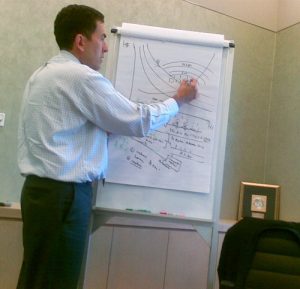A financial advisor's most important skills are sales skills. Let's see if you agree.
 Can we agree that your job is to get people to take action?
Can we agree that your job is to get people to take action?
If your prospects don't take action, you don't earn anything. If your prospects don't take action, they cannot be better off. So either way, your most important task is getting the prospect to take action or no one wins.
I would like this post to help you. I cannot teach you sales skills in a single post but I can direct your attention to your lack of these skills. Additionally, I can hopefully uncover why you lack these skills and hope that you gain reason to add them.
To continue, the main objective, to have the prospect act, is primary to all other objectives which advisors may hold dear:
- explaining financial products and services
- financial forecasting and planning
- providing investment discipline, etc.
So now that we've isolated that getting the prospect to take action is your most important job, we are left with the question of why so many financial advisors have such poor sales skills. How do I know this? I have listened to hundreds of them and few have sales skills. However, much like the average driver assesses his driving skills superior to 80% of other drivers, financial advisors think that sales skills are the least of their problems.
Sales skills are by definition a prerequisite to have prospects act. There is a very good chance you believe that more than 50% of the prospects you have met have become clients. I recommend that you start keeping records and determine the accuracy of your estimate. I assert that most fish have gotten away.
In my informal polls of advisors, 80% have never had formal sales training. By formal sales training I mean a multi-week sales course such as Dale Carnegie or Sandler that focuses on sales skills regardless of the product or service being delivered. Therefore, training that the wirehouse, mutual fund or insurance company may provide can never be considered sales skills. These are product trainings.
In my first year of financial advising, I quickly realized that my success would depend on sales skills. I enrolled in the Dale Carnegie sales training and after the 10 weeks ended, I volunteered as a group leader so that I could sit through the 10 weeks again to drill the concepts into my brain. I have never stopped reading on the skills of persuasion, sales, communication and psychology as it is related to success as a financial advisor. Which, we have agreed, is getting the prospect to take action.
Do I have an overly important view of sales skills in the role of an advisor skill set or do the following types of advisors simply miss the big picture? Which of these advisor positions do you think account for poor sales skills?
Sales skills are not important to my success. If I do a good job for my clients, they will refer me to others.
To such a position I can only ask,"how's that working for you?" The advisor who thinks that business comes in passively, by referrals or by magic, is self-deluded. Interestingly, some people can hang on to this false notion for years. They can never understand how it is that advisors of lesser ability and lesser competence do many times more business.
I'm a professional, I don't sell!
 Clearly, these advisors believe that selling is some inferior activity to which they are senior. They have a belief that they maintain professionalism by avoiding engagement in sales strategy or tactics. Of course, this contradicts our prior agreement that your value is in getting others to take action. So is this professional just stupid? Are they so indoctrinated by the principles of their profession that they are blind to what they really do? What is their gauge for success if not fees or commissions generated which evidence how many people they've helped?
Clearly, these advisors believe that selling is some inferior activity to which they are senior. They have a belief that they maintain professionalism by avoiding engagement in sales strategy or tactics. Of course, this contradicts our prior agreement that your value is in getting others to take action. So is this professional just stupid? Are they so indoctrinated by the principles of their profession that they are blind to what they really do? What is their gauge for success if not fees or commissions generated which evidence how many people they've helped?
To me, one's professional skill is a foregone conclusion and not a place to hang one's hat. To highlight one's CFP® or ChFC® credential is misguided in that it is an "of course" that you should be technically knowledgeable in the skills and craft of your profession. Does your physician ever tell you the high marks he got in medical school or remind you that he completed medical school? Or, do you assume his competence as a foregone conclusion? I believe you do. Therefore this notion that, "I'm a professional, I don't sell" seems unhinged to any logic.
 It also seems to me that any advisor taking this position belittles sales skills. They hold sales skills as something they've seen practiced on a used car lot. To these advisors, selling is the act of convincing, persuading, being pushy, overbearing and obnoxious. This is not sales. The tactics practiced by the used-car salesman are some useless notions passed down over decades by the blind leading the blind.
It also seems to me that any advisor taking this position belittles sales skills. They hold sales skills as something they've seen practiced on a used car lot. To these advisors, selling is the act of convincing, persuading, being pushy, overbearing and obnoxious. This is not sales. The tactics practiced by the used-car salesman are some useless notions passed down over decades by the blind leading the blind.
Let me tell you what sales skills really are. I have two definitions.
1. Sales is the asking of appropriate questions so that the prospect sees the best course of action for himself.
2. Sales is the enrolling of people in their own vision which may have become obfuscated or forgotten.
I assert that anyone practicing either of these definitions with mastery has in fact achieved an important and high calling in their life. What better way could you spend your life than opening the eyes of another to the potential of their life? When you do this, the prospect does not feel like they are "being sold." To the prospect, the experience is sitting across from an uncommonly insightful master.
I am a financial advisor and my job is to explain financial choices.
This position is like your surgeon stating that his job is to explain two different ways to do surgery and let you choose. As the prospect, you have insufficient knowledge or experience and must rely on the professional to make the choice.
The financial advisor who believes that they are in the financial advice or information dissemination business, rather than the psychology business, is misguided. I have reminded advisors many times that you don't manage portfolios, you manage relationships. 
So a financial advisor who thinks that their job is to understand, interpret and explain the intricacies of the economy or markets or financial products does not understand their profession. They are a slave to the tools of their profession rather than their clients' desires or needs.
Let me offer an analogy. Imagine for a moment that you invite a contractor to provide a bid on a room addition for your home. You would expect the contractor to ask you a number of questions such as:
- how will you be using this room?
- how large of a room do you want?
- what kinds of materials do you want?
- do you want high ceilings or the standard 8'?
- do you want lots of light?
But instead, the contractor shows up and begins to explain that he uses a laser tape measure to get the greatest accuracy in measuring his cuts before he makes them. He further explains that he only uses Black & Decker power tools because of the consistent electrical output from the power source. He continues with a litany of details about his tools, their features and benefits. This is exactly what so many financial professionals do who don't understand that the business of financial advising is the people business and not the financial services business. The tools used are inconsequential to the task at hand.
Next we have the advisor who believes his primary responsibility is to provide investment discipline. His job is to provide a plan for the client and make sure that the client sticks to the plan. It seems to me that getting a client to stick to a plan might require superior skills of persuasion i.e. sales skills. Selling does not always mean selling a product; it also means selling ideas and if the task is to keep a client on course in light of their emotional imbalances, sales skills would seem paramount.
Then there are the advisors who tell me they know how to sell because they have been doing it for 30 years. Such comment immediately brings to mind how so many have one year of experience repeated 30 times.
These advisors have never made the distinction between routine conversation and the special requirements of a sales conversation. In normal conversation, our only objective is to trade points of view. You say, "I think the Giants are a great team." "No way," says your friend, "they suck." In normal conversation, there is no objective to have the other party take action. We may as well just spit at one another.
Normal conversation is like flying a single-engine Cessna while a powerful sales conversation is like flying an F-15. The pilot of the F-15 needs far more complex skills and training. No amount of years flying the Cessna will suffice.
Related to this advisor who believes sales skills are a matter of experience is the one who tells me that sales is really about listening. Unfortunately, that is only part of the formula. After listening, the advisor must provide astutely guiding questions moving the prospect to realization and action.
There is a quiz you have taken to determine if you have sales skills. Have you ever heard prospects say the following:
- I'll think about it...
- Call me after...
- We're not going to do anything right now.....
- I'm going to wait till after the election.....
- I'll wait till after the Fed raises rates.....
- I'm waiting till the cows come home....
- I need to figure out what I'm wearing for Halloween...
These are all responses from prospects telling you that you have inadequate sales skills; you have failed. The failure is that you have not moved the prospect to beneficial action. In my early advising years, I blamed this on the prospect stupidity. It took a while before I realized it was my stupidity and inadequacy.
I would commiserate with the other advisors about my unassailable logic yet the prospect did not buy. What an idiot! How simple does it have to be, man?
The Ben Feldman Lesson on Sales Skills
As I was forming this post in my head, I started reading Pre-Suasion by Robert Cialdini. I was surprised that the author mentioned Ben Feldman who is known in the insurance industry as the all-time sales guru. Here's why.
Without straying 60 miles from his home in the shabby old river town of Liverpool Ohio (population less than 15,000), Feldman would sell more life insurance in a day than most agents sell in a year, more in a year than most sell in a career. In the '70s, he personally wrote more business than 1,500 of the nation's 1,800 life insurance companies.
Story has it that his particular sales skill was the metaphor. While other life agents likely use the term "death benefit" a hundred times in a sales presentation, Feldman referred to death as "walking out of life." And he would finish the metaphor, that when you walk out of life (and implied walk out on your family), insurance money walks in.
So while the average advisor or agent uses the terminology of the product provider, just a simple change of terminology to be consistent with how the prospect thinks can have a major positive effect. Is it a fair indictment that the average advisor cannot even alter his jargon to match the prospect's terms of language?
The lack of sales skills does not ensue merely from laziness. The cause is far more sinister. Advisors are in fact self-focused or product-focused. They are not client-focused no matter how many times they say so. Like the fish who spends his life in water, they cannot see the environment in which they live. It's an environment of products, services, product manufacturers and industry jargon. The client is a necessary evil --the money source -- to make the whole game work.
The Unspoken Industry View on Sales Training and Sales Skills
It's no surprise that the public holds the securities and insurance industries in low regard. And the opinion is justifiable as folks at the top of these organizations seem to have little regard for the buyers as evidenced by the litany of fines paid and rules broken.
If these organizations were to promote sales skills for their reps and agents, it might look all the worse. It might look as if the organizations solely wanted their producers to sell more stuff. Perhaps this is why there is no real sales training and it's all product training.
What do you think? Am I being too harsh or does the agent or advisor struggling to have the business they desire have only themselves to blame? Specifically, their lack of prospect/client focus which when applied would readily reveal lack of sales skills and client focus?
